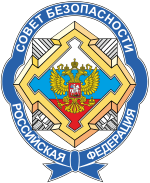Loading AI tools
Constitutional body of the Russian president From Wikipedia, the free encyclopedia
The Security Council of the Russian Federation (SCRF or Sovbez; Russian: Совет безопасности Российской Федерации (СБРФ), romanized: Sovet bezopasnosti Rossiyskoy Federatsii (SBRF)) is a constitutional consultative body of the Russian president that supports the president's decision-making on national security affairs and matters of strategic interest. Composed of Russia's top state officials and heads of defence and security agencies and chaired by the president of Russia, the SCRF acts as a forum for coordinating and integrating national security policy.
| Совет безопасности Российской Федерации | |
 Emblem of the Russian Security Council | |
| Agency overview | |
|---|---|
| Formed | 5 March 1992 |
| Preceding agency | |
| Jurisdiction | Russia |
| Headquarters | Moscow, Russia |
| Agency executives |
|
| Website | scrf |



The Security Council of the RSFSR was legally set up by Congress of People's Deputies of Russia[1][2][3][4] in April 1991 along with the office of the President of the RSFSR (the RSFSR at that time operated as one of the constituent republics of the USSR). The 1993 Constitution of Russia refers to the SCRF in Article 83, which stipulates (as one of the president's prerogatives) that the SCRF is formed and headed by the president of Russia, also saying that the status of the SCRF is to be defined by a federal law.
The 2010 Law on Security defines the legal status of the SCRF as a "constitutional consultative body" concerned with elaboration of decisions by the president in the fields of Russia's defence and national security.[5] The SCRF comprises its chairman (the president of Russia), the Secretary of the SCRF, its full members, and members, as appointed by the president.[6] Under the law, the Secretary of the SCRF is appointed by the president and reports directly to him.[7]
Decisions of the SCRF are adopted by its full members and approved by the president, who may issue decrees or orders for the purpose of implementing them.[8]
The Presidential Decree of 6 May 2011 enacted the Statute of the SCRF[9] as well as a host of other statutes pertaining to the structure and composition of the SCRF.[10]
It has been argued[by whom?] that the coordinating role defined for the Security Council in the National Security Strategy to 2020,[11] published in May 2009, represents a strengthening of the council's influence and importance within Russian governance under its new Secretary Nikolai Patrushev.[12]
On 16 January 2020, president Vladimir Putin signed a decree that amended the relevant laws and established a new state office of Deputy Chairman of the Security Council.[13] On the same day, president Putin appointed Dmitry Medvedev as Deputy Chairman of the Security Council.[14]
As of 30 September 2024:[update][15][16][17][18]
| Name | Office |
|---|---|
| Vladimir Putin | Chairman of the Security Council (as president of Russia, ex officio) |
| Dmitry Medvedev | Deputy Chairman of the Security Council |
| Sergei Shoigu | Secretary of the Security Council |
| Mikhail Mishustin | Chairman of the Government |
| Anton Vaino | Chief of Staff of the Presidential Executive Office |
| Sergei Ivanov | Special Presidential Envoy on Issues of Environmental Activities, Ecology and Transport |
| Valentina Matviyenko | Chairwoman of the Federation Council of the Federal Assembly |
| Vyacheslav Volodin | Chairman of the State Duma of the Federal Assembly |
| Andrey Belousov | Minister of Defence |
| Sergei Lavrov | Minister of Foreign Affairs |
| Vladimir Kolokoltsev | Minister of Internal Affairs |
| Alexander Bortnikov | Director of the Federal Security Service |
| Sergei Naryshkin | Director of the Foreign Intelligence Service |
| Nikolai Patrushev | Aide to the President of Russia |
Seamless Wikipedia browsing. On steroids.
Every time you click a link to Wikipedia, Wiktionary or Wikiquote in your browser's search results, it will show the modern Wikiwand interface.
Wikiwand extension is a five stars, simple, with minimum permission required to keep your browsing private, safe and transparent.